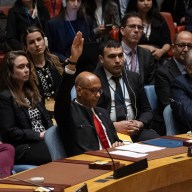When he’s not operating on patients, hosting a talk show or authoring books, Dr. Mehmet Oz devotes his time to his charity, HealthCorps, a Peace Corps-like program that sends college grads into high schools to mentor students on health and well-being. We spoke with Dr. Oz at a reception celebrating Evamor water’s partnership with HealthCorps, which will fund his mentoring program in additional schools across the U.S.
Why is peer-to-peer mentoring the right approach to take to teach kids about their health?
Well, part of it is because I have kids. I was asked by their school to give a talk to them once about 10 years ago, and they seemed sort of bored but I gave the talk anyway. The next day, as I got to the hospital, I had probably a dozen phone calls from corporate executives, lawyers [and] other doctors saying their kids had come home that night and had told them things like “If you have a piece of bread, it’s like having a candy bar.” And it began a process in my mind: If we can get these kids to talk with each other in a way that makes it cool to push back against your parents, they’ll do it. I’m not the one to deliver that message, but I can get college kids to do it. I was working a lot with Timmy Shriver and Maria Shriver, and their father, Sargent, started the Peace Corps, so I put the two experiences together. I said, “You know what? We can create an organization where we use the same kind of enthusiastic energy that young college graduates have, put them back in schools around the country and allow for that unique experience when a 21-year-old talks to a 17-year-old.” I’m not the right person to deliver the message, but I can give the 21-year-old the information they need to make it happen. That was the foundation of the concept. And I think the best way of scaling a program, inexpensively building it and touching a lot of lives — mentoring is the way to go. These volunteers are able to go out and do a lot of good. And they only do it for a couple years — they go off to med school or whatever they want to do in life — but it gives them two years of really great experience and it gives us two years of their service, which is hugely valuable.
What are your goals for the program, and what are you doing to reach them?
I want to have HealthCorps schools in every major city in America, and I want to have them in every state. We may not be in every school, and I think one of the things we’re learning is that we can develop [the] best practices from the many schools we’re in that other schools can adopt and begin to use in their own programs. We’re gonna call it HealthCorps University. So either you’ll have one of my volunteers in your school who will teach your kids about health, and [for] anybody else, health teachers can take the syllabus and use it on their own. It’s written in a way that’s very accessible to high schoolers, and it’s free, so it takes away a lot of the obstacles to implementing it.
How can parents get involved?
The most important thing for parents to do is to get their kids to either use the website and the content on it or, more importantly, talk to their school systems about whether they can have a HealthCorps program there. What makes the school systems great is the teachers and the parents collaborating. We have wonderful programs that we have started primarily because parents went to schools and said, “I see this program, I want to have it.” And then [they] find some kind of a hybrid program that’s affordable and works.
















